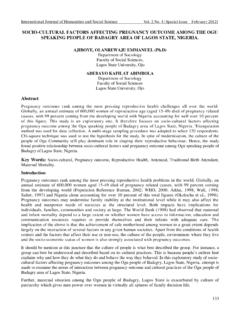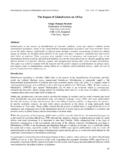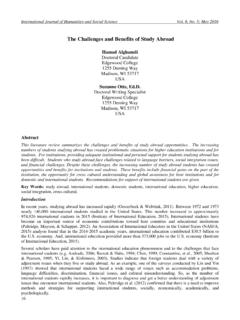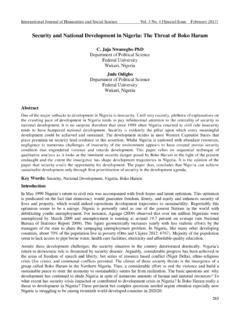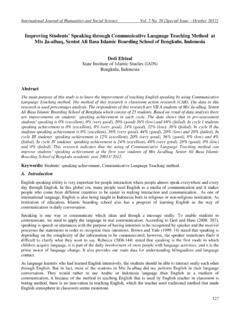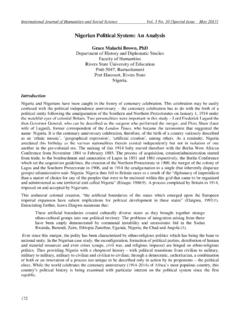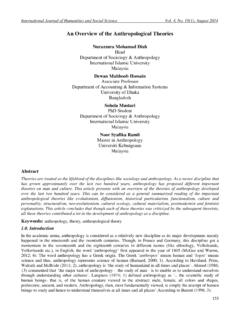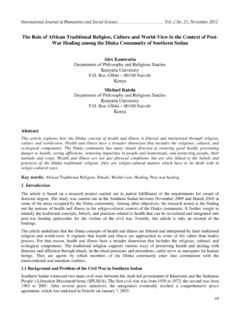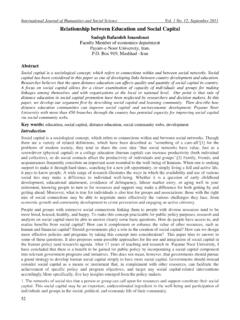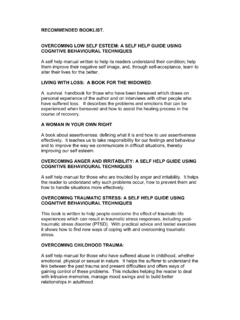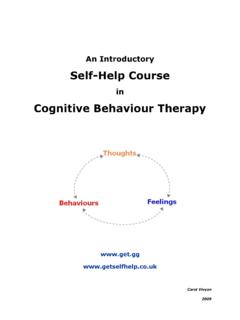Transcription of The Relationships between Self Defeating …
1 International Journal of Humanities and Social Science Vol. 3 No. 6 [Special Issue March 2013] 255 The Relationships between self Defeating Behavior and self - esteem among Jordanian College Students Omar M. Alshawashreh Faisal. K. Alrabee Qasem M. Sammour Faculty of Education Yarmouk University Irbid, Jordan. Abstract This study aimed to investigate the relationship between self - Defeating behavior and self - esteem among Jordanian college students at Yarmouk University. The sample consisted of (435) students (182) of them were males, and (253) were females. all were selected randomly from students who were enrolled in the second semester of year 2011/2012 at the Yarmouk university. The results indicated that students who have a level of fair achievement have more of self - Defeating behavior than their peers of very good level of achievement. This mean the achievement level can be good predictors of students' self - Defeating behavior.
2 Also the result revealed that females have a higher level of self - esteem more than their males' peers. However the differences between students were not statistically significant at ( &.05). Moreover, The results indicated that no significant difference were found between students by their gender, years in college, , high schools grade point average regarding their level of self - Defeating behavior or the total level of self - esteem . Also no significant relationship was found between self - Defeating behavior and self - esteem among students. Key words: self - Defeating behavior, self - esteem , college students, years in college, educational levels, achievements level, gender, high school grade point average, Jordan. Introduction self - Defeating behavior refereed to the idea that people knowingly and intentionally do things that will cause them to fail and bring trouble or harm on themselves.
3 The self -handicapping strategy can be linked to self - Defeating behavior. People repeatedly claim credit for successes but deny blame for failures. The fact that people will intentionally handicap themselves in order to prevent responsibility for failure is an example of self - Defeating behavior. self - Defeating behavior is described as any action which a person does to bring failure, suffering, or misfortune on themselves (Baumeister & Bushman, 2008). self - Defeating behavior has been a fascinated subject to mankind and to many people in the field of psychology. Many people's behavior may produce results that are harmful or costly to them. Some people they planned to fail, harm themselves or attempted suicide, engage in unsafe sexual activities, use harmful drugs, gambling, procrastinate, mistreat or alienate others or their love' ones.
4 They waste their money, neglect to take their medicine, and perform many other destructive acts that could be possibly avoided. self - Defeating behavior is quite real between college students and among all of mankind. The only question is why people and specially college students do it? According to Beaumeister & Scher, (1988), intentional self - Defeating behaviors consisted of three different models: The first model is called, primary self destruction which includes those people who usually and intentionally choose an action that they know will bring harm to them. An example of this type of behavior is called, masochism or self -mutilations. The Special Issue on Behavioral and Social Science Centre for Promoting Ideas, USA 256 The second model is tradeoff in which people knowingly make a trade-off in a situation by choosing a certain option that has some benefit but also has the potential to cause harm to themselves as well.
5 The third category of self - Defeating behavior includes counterproductive strategies, in which the people neither desires nor foresees the harm on themselves, but rather pursuing a desirable outcome. However, they choose a strategy or methods that produce the opposite of their desired outcomes. This type of behavior is very common among young adults and usually results in some kind of self -harm outcomes. The concept of self - esteem has been viewed or divided into two types high or low. People with high self - esteem characterized by the feelings of self -acceptance and have more of social interactions which influence them to lead happier and healthier lives psychologically. However, people with low self - esteem characterized by poor self -acceptance and poor social interactions (Kernis, 2003). According to Baumeister, Campbell, Krueger, & Vohs, (2003), people with high self - esteem more likely to lead happier and more psychologically healthy lives.
6 Individual with a high self - esteem is more likely to become or have narcissistic personality disorder. self Defeating behavior occurred when people self - esteem is low or being threaten. When people have a low self - esteem , they are more likely to be depressed, anxious and, emotionally distress, which is related to self - Defeating behavior. self -regulation allows people to prepare or situate themselves to a certain circumstances and adapt or adjust to it. self regulation is related mostly to people self -control that, result from the failure of people to regulate themselves or their behaviors properly (Beaumeister, 1997). Socially excluded people are more likely to be aggressive towards others, less willing to help or cooperate with others, engage in self - Defeating behaviors like risk-taking and procrastination (Twenge, Catanese, & Baumeister, 2002).
7 self - Defeating behavior defined as the idea that sometimes people do things that will cause them to fail or bring them trouble. It is defined as any deliberate or intentional behavior that has clear, definitely or probably negative outcome or effects on the self . self - Defeating thoughts or behaviors can lead to negative feelings and create a block in the road of people success even though there is no rational or logical explanation as to why they cannot achieve their goals or finish their unfinished business. The thing about self Defeating is that it is not a lack of knowledge, effort or even desire that keeps people from achieving their goals and outcomes. But rather, it is the negative thoughts or the inner self -dialogue that confuses the issue and sabotage the outcome (James, 1998). The following are some examples of self - Defeating behaviors: Feelings of meaninglessness, excessive worry, drug abuse, lying, and compulsive behavior.
8 Moreover, withdrawal , lack of motivation ,dependency, fear of failure ,procrastination , inferiority feelings ; defensiveness , fear of stating ones point of view , fear of success, excessive guilt ,unrealistic mistrust ,unrealistic fear, and losing tempers ( Urell, 2008). The following are some of the possible answers to the reason of self - Defeating behavior: Some people involve in a tradeoffs choices, unfortunately the good outcome is linked to something bad. As a result of this dilemma of making choices, people tend to accept the bad choices in order to get the good one. People may choose a counterproductive strategies, or methods but it backfires and produces the opposite of the intended result. self - Defeating behavior is accomplished when the outcome cost outweighs the gain.
9 Shy or anxious people may withdraw from social interactions in order to avoid possible rejection or humiliation, but it backfires on them by preventing them from having the opportunity to socialize with desire people or events. Lack or faulty knowledge may contribute to overconfidence of people so that they do not recognize the need to be careful or the know how to protect themselves. People are more likely to behave in a self - Defeating or destructive manner when there are threats made to their ego or when they have low self - esteem . When a person has a low self - esteem , they are more likely to be susceptible to having depression, anxiety and, emotional distress. self - regulation failure is yet another supposed cause of self - Defeating behaviors. One s self regulation is related mostly to one s self -control. self -regulation allows a person to prepare themselves to a certain situation and adapt to that situation ( Baumeister, Smart,& Boden, 1996).
10 Emotional distress impairs people willingness to self -regulate their decision process to think through their options carefully. self - Defeating behavior is often based on pursuing a short-term gain that carries a long- term risk or costly outcome. International Journal of Humanities and Social Science Vol. 3 No. 6 [Special Issue March 2013] 257 The delayed reward is the logical and the rational choice. However, some people have difficulty resisting the temptation to take the immediate reward or gratification. Ultimately, self - Defeating behavior may often result from the failure of the self to regulate its behaviors properly. For example, upset person might drive too fast in traffic, and that may lead to a crash. People who are upset may fail to think through the implications and consequences.
